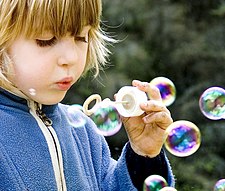
Back لعب (نشاط) Arabic Kawat BCL खेल (सामान्य) Bihari খেলা Bengali/Bangla Joc Catalan Káh-dièu CDO Leg Danish Śōg (ativitê) EML Play (activity) English Juego (recreación) Spanish


Play is a word used in psychology and ethology to describe voluntary activities associated with recreational pleasure and enjoyment,[1] and with early learning in mammals. Although everyone understands what the word means, it is extremely difficult to define.[2] Play is usually connected with children and their juvenile-level activities, but it can also be a useful adult activity, and occurs among other higher-functioning animals as well.
Many of the most prominent researchers in the field of psychology (including William James, Sigmund Freud, Carl Jung, Jean Piaget and Lev Vygotsky) have viewed play as endemic to the human species. Play may be frivolous; but it may be serious. A player can be intently focused on his or her objective (in the zone), particularly when play is structured and goal-oriented, as in a game. Accordingly, play can range from relaxed, free-spirited and spontaneous through frivolous to planned or even compulsive.[3]
- ↑ Garvey C. 1990. Play. Cambridge, MA: Harvard University Press.
- ↑ Reber, Aurthur S. & Emily S. 2001. The Penguin dictionary of psychology. 3rd ed, Penguin Books, p543. ISBN 0-140-51451-1
- ↑ Huizinga J. 1955. Homo Ludens; a study of the play-element in culture. Boston, Beacon Press